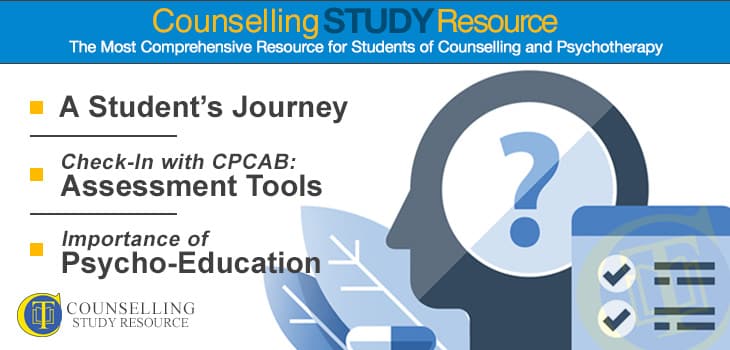124 – Assessment Tools in Counselling
A Student’s Journey – Importance of Psycho-Education
In episode 124 of the Counselling Tutor Podcast, Ken Kelly and Rory Lees-Oakes talk to a special guest about her journey through counselling training. ‘Check-In with CPCAB’ then looks at assessment tools in counselling. Last, the presenters explore the value of psycho-education in counselling.
A Student’s Journey (starts at 1.30 mins)
Who better to tell us about a student’s journey than a recent student herself!
Ken and Rory talk with Julie Naylor, who has recently qualified following a four-year period in which she worked her way through the level 2 introductory course, level 3 certificate and finally level 4 diploma.
Julie talks about her motivations to become a counsellor, and the challenges she faced during this time.
Describing how she was able to overcome these, Julie names several resources that she has found invaluable during her training:
- Counselling Tutor Facebook page (where you’ll find her as ‘Julie Woolie Woo’)
- Counselling Tutor website
- Counselling Study Resource (CSR – containing over 90 hours of lectures).
Check-In with CPCAB: Assessment Tools in Counselling (starts at 25.05 mins)
Rory speaks to Ray van der Poel (Head of Business and Development) at CPCAB (Counselling & Psychotherapy Central Awarding Body) about the use of assessment tools in counselling.
Ray lists various tools – PHQ-9, GAD-7, Beck’s Depression Inventory, CORE-10 and CORE-34 – choosing to focus on the CORE ones as he has recently spoken about these with John Mellor-Clark, one of the founders of CORE IMS, the company responsible for producing these.
Just as CPCAB is the UK’s only awarding body run by counsellors for counsellors, the CORE assessment tools are designed by counsellors for use by counsellors.
The completion of counselling assessment tools is often seen as a tick-box exercise and is explained away to clients as relating only to the need to collect before-and-after data for funding purposes.
In contrast, Ray describes how they can be integrated into the therapeutic process to the benefit of both clients and counsellors.
Comparing assessment tools to a thermometer that can take a snapshot of a person’s current wellbeing, Ray reports that John Mellor-Clark sees their use not as an administrative task but as a clinical skill, offering two key benefits:
- enabling the counsellor to collect a lot of information efficiently
- helping clients to articulate a wide range of their current experience.
Different organisations have different requirements regarding the frequency of completing assessment tools in counselling. They are commonly used at the first and last session, but some agencies choose to use them every time.
If you are in private practice, then of course you have the choice to choose the frequency yourself.
For more information, please see CPCAB’s website.
Rory has also written a handout on assessing clients. You can download this free of charge here; it is also available through the Handouts Vault and Counselling Study Resource (CSR).
Importance of Psycho-Education (starts at 37.55 mins)
Psycho-education may at first sight seem to clash with the person-centred principle of being non-directive.
Rory explains, however, that understanding of the human brain has come a long way even since Carl Rogers’ death in 1987. His view is that we have an ethical imperative to share with clients information that can help them.
For example, it can be very freeing for a client who has been struggling with shame and guilt at how they reacted in a stressful situation to have this normalised through psycho-education on how the human brain and body respond to traumatic events.
You’ll find various relevant lectures – e.g. on trauma, neuroplasticity and Stockholm syndrome – in the CSR.
Free Handout Download
Assessing Clients
